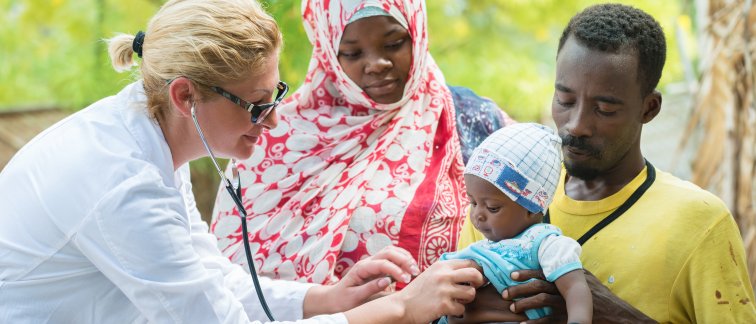It received significantly less attention than corona vaccine development, but in the past few years, malaria vaccine development has been moving in the right direction. 2022 counted another series of larger and smaller breakthroughs. In this article, Martin Grobusch, Professor of tropical and travel medicine at Amsterdam UMC, shares his opinion about where we stand today in malaria vaccine development.
A mosquito is one of the greatest natural enemies humans have ever encountered. The parasites we ingest after being bitten by the mosquito Anopheles cause malaria, which traces a trail of devastation through societies. Because even though the number of countries where malaria occurs has been imposingly reduced in recent decades, the numbers do not lie. In 2021, malaria killed more than 620,000 people, mostly young children. For last year, these numbers will not be any lower.
But there is light at the end of the tunnel. Whereas progress in the fight against malaria in recent times has been made primarily through treatment and prevention, such as impregnated mosquito nets and spraying Anopheles breeding sites, a new weapon is slowly but surely emerging: vaccination.

No magic wand
'A possible malaria vaccine will most certainly not be a magic wand that eliminates malaria', Prof. Grobusch immediately tempers expectations. Prof. Grobusch: 'A sterilizing vaccine with lifelong immunity, like against measles, we will probably never develop for malaria. But neither is that necessary to make a big difference for the children who are now at high risk. The risk of death from malaria is specific, and vaccines in development seem to be a barrier to that.'
Malaria is a disease that almost everyone in high-risk areas gets, often several times a year. There are now about 250 million cases of malaria annually. This is how people steadily build up a so-called partial immunity: they still get malaria, but do not become seriously ill. The deaths occur mostly in children who have not yet built up this immunity. Eighty percent of malaria deaths are children under the age of five. Anyone who can help that particular group through the first few years of life takes away the bulk of the deaths.
A second important factor is that malaria often does not occur year-round. In large parts of Africa, it occurs only during the rainy season. This is also true in northern Nigeria, the country where a quarter of all malaria deaths on earth occur. Conclusion: protection against malaria does not have to work all year round.
Development is rapid
Therefore, what we need is a vaccine that can help children under five through the first infections and that should be especially effective during the rainy season.
That it is so specific is fortunate, because current vaccines do not yet achieve such results. Among the many vaccines in development, two "families" stand out as leaders. The best known is RTS,S - a vaccine currently in use and recommended by the World Health Organization. Currently, RTS,S still has a limited duration of protection, in addition, it has not yet been demonstrated whether RTS,S prevents mortality from malaria in individual cases. But what we do know is that among vaccinated groups, mortality is significantly lower than among unvaccinated people.
In that same family of vaccines falls R21, from Oxford University, which is already well advanced in clinical trials. The hope is that this vaccine can be used on a fairly large scale in the coming years. Especially when combined with the prevention and treatment methods that are already in place, it has the potential to significantly reduce deaths.
In addition, there is a second vaccine family that showed promising results in 2022. This family carries the name PfSPZ and is being developed by a global consortium that includes Prof. Grobusch and his team at Amsterdam UMC. PfSPZ consists of a whole group of vaccines being developed simultaneously, which, unlike all others, are injected directly into the bloodstream, the place where the malaria parasite spreads.
A study of clinical trials among adults in Mali and Burkina Faso was published in December 2022. PfSPZ proved safe and provided significant protection, although it required three doses in a month. The duration of protection was also not yet satisfactory: it wore off after three to five months.
Nevertheless, says Prof Grobusch, that does precisely help people in many malaria areas get through the rainy season. The next stage now is to test this vaccine on a group of children. If all goes well, that could lead to a vaccine that can be used en masse within a few years. Meanwhile, development continues. Prof. Grobusch compares it to the early years of aviation: 'The Wright brothers also made very few feet on their first flight, but twenty years later everyone was flying around the world.'
The distribution challenge
With so many promising vaccines in development, the actual breakthrough of a vaccine seems a matter of a few years at most. This is not the same for distribution; this is proving to be a tricky issue. People at greatest risk of malaria mortality live in western and central Africa, far apart, economically vulnerable, with poor infrastructure and unstable security. To deliver three frozen vaccine doses there at the beginning of each rainy season and inject them intravenously into young children every two weeks is going to be a struggle. Not to mention areas where malaria occurs year-round, such as the Congo Basin.
'We are far from achieving it', Prof. Grobusch acknowledges, but he vehemently opposes fatalism. Prof. Grobusch: 'Of course we are all looking for a vaccine that is a magic bullet, cheap, with no side effects and a one-off. That search continues as well. But for now, we are forced to accept the biological limitations. That is no reason not to try spreading the vaccine. Most of these barriers also apply to a bottle of Coca Cola. If we can manage to distribute that globally, so can medicines. And then we can probably already achieve great results in the next few years.'
Source: read the original (Dutch) article by Joost van Egmond in Trouw here.

